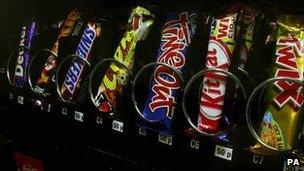Call for rules on hospital vending machines in England
- Published

Vending machines tend to dispense high-calorie food like chocolate
Hospital vending machines in England contain too many high-calorie snacks, and guidelines should be introduced to make them healthier, says a cancer prevention charity.
A World Cancer Research Fund (WCRF) survey found 73% of English health trusts do not have a policy on the food sold in their vending machines.
Yet, the Welsh and Scottish governments introduced guidelines in 2008.
Experts say the NHS must send out a clear message on healthy food choices.
England has no national guidelines on the health content of food and drink sold in hospital vending machines, unlike Scotland and Wales where machines are recommended to be stocked with at least 30% healthier choice products.
The WCRF survey asked all 146 acute hospital trusts in England about their policy on vending machines.
Of the 110 which responded, 81 said they did not have a policy. Only 11 said they did have a vending policy - and 18 hospitals said a policy was under development.
Obesity link
Fifty-eight per cent of hospitals said their vending machines were not stocked with 30% healthy products.
But 67% responded that they offered at least one healthier choice option for each product type.
Amanda McLean, general manager at the WCRF, said chocolate bars, crisps and sugary soft drinks were not appropriate items to be selling in hospitals.
"Because there is strong evidence that these foods cause obesity - a risk factor in diseases such as cancer, type 2 diabetes and heart disease - they are partly to blame for many people ending up in hospital in the first place," she said.
"Hospitals should put an end to vending machines that sell only high calorie food and drink. They should be beacons of good health in our communities and encourage and support people in making healthier choices about the food they eat."
She said the UK government should make England fall into line with Scotland and Wales on the issue.
At the British Medical Association's conference in June, doctors backed calls for hospitals to ban the sale of junk food in vending machines and cafes.
The BMA's science board is now looking at the issue in detail in order to persuade the Department of Health to introduce guidelines for all hospitals across England.
The Academy of Medical Royal Colleges (AoMRC) called for a ban on unhealthy foods in hospitals earlier this year.
Nutritional benefit
Professor Terence Stephenson, chairman of the AoMRC, said: "The NHS needs to avoid providing the same obesogenic environment as the high street and send out a clear message that it takes obesity and the health of the nation seriously by offering patients and staff alike healthy food options.
"In February the Academy called for improved food standards in hospitals, including vending machines.
"There is no reason for England to fall behind other UK nations and not have these guidelines in place."
Five years ago, both the Welsh and Scottish Governments introduced guidelines for hospital trusts on this issue.
The Scottish Government produced nutritional guidance, external on what makes products healthy and encouraged NHS boards to remove soft drinks with high sugar content.
Its guidelines also aim to make at least 30% of vending products 'healthier choice' and it says these products should be positioned prominently in vending machines.
In Wales, the government issued guidance, external that included a five-point charter ensuring food and drink sold from vending machines has a positive nutritional benefit.
These require that food and drinks must comply with nutritional criteria.
A spokesperson from the Department of Health said: "Hospitals in England have a clear responsibility to promote healthier choices in vending machines so staff and visitors can eat good quality food.
"We know that some hospitals have already signed up to our Responsibility Deal and committed to making healthier food and drink available, and would encourage other hospitals to do the same and look after their staff, patients and visitors."
Dr Johnny Marshall, director of policy at the NHS Confederation, which represents all organisations providing NHS services, said many trusts rent space to commercial outlets to provide a good service to patients and visitors.
"Nowadays, the majority of these offer fruit, smoothies, tea and coffee, as well as a range of sweets and treats," he said.
"And if a patient who has been in hospital a week wants a few mint imperials, or a parent wants to buy their child who has just had a broken arm reset some chocolate buttons, as a doctor I think that is absolutely fine.
"The key thing is that the NHS ensures there are easy ways for patients, staff and other users to make healthy choices.
"There isn't a hospital trust in the country that would prioritise the relatively small amount of income they get from these sources above the overall health of their local community."
- Published27 June 2013
- Published22 February 2013
- Published22 February 2013
- Published17 February 2013
- Published23 September 2011